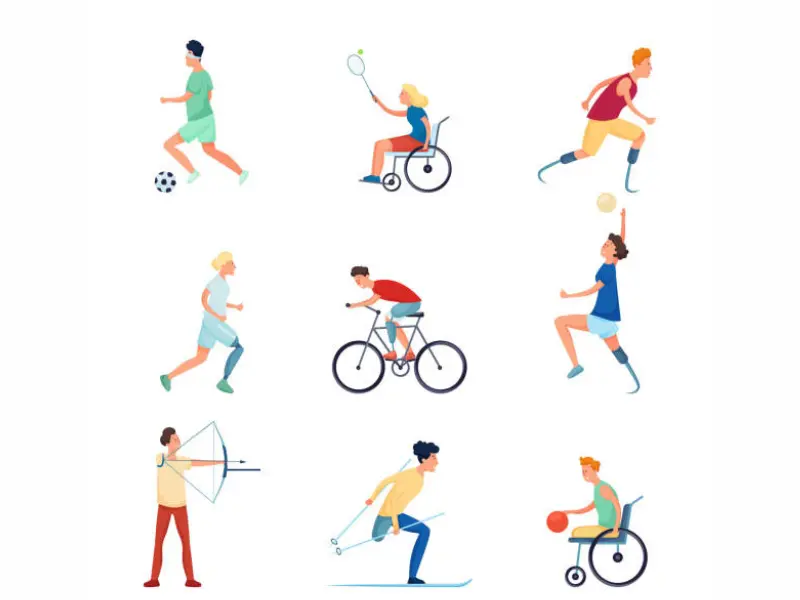Individuals with disabilities often encounter societal barriers that limit their opportunities for education, employment, and social engagement. Disability can evoke negative perceptions and discrimination, leading to exclusion from community life, which can harm their mental well-being. This stigma can also foster inactivity and a sense of dependency, particularly for those with physical disabilities, resulting in further mobility restrictions beyond the effects of their disability. Sports for disabled people are proven to improve their mental health and empower them.
Benefits of sports for a disabled person
Sport has the power to break down societal barriers and reduce the stigma and discrimination faced by individuals with disabilities. It allows people with and without disabilities to interact in a positive and inclusive environment, challenging negative assumptions about disability. Some benefits of sports for individuals with disabilities include:
- Improved physical health: Sports participation can enhance physical fitness, coordination, and motor skills.
- Enhanced mental health: Sports can boost self-esteem, confidence, and overall well-being, particularly for individuals with disabilities who may experience social isolation.
- Social inclusion: Sports can foster social connections and break down barriers between individuals with and without disabilities, promoting a more inclusive society.
- Skill development: Sports provide an opportunity to develop new skills, both physical and mental, and improve the overall quality of life.
- Increased independence: Through sports, individuals with disabilities can develop greater independence, self-reliance, and self-determination.
The Needs of a disabled sportsperson
People with disabilities have unique needs that must be met to ensure their safety, inclusion, and enjoyment of sports. Here are some of the critical needs of disabled athletes that should be considered:
- Accessible Facilities: Disabled athletes require accessible facilities, including ramps, elevators, and accessible restrooms.
- Adaptive Equipment: Disabled athletes may require adaptive equipment, such as prosthetic limbs, wheelchairs, or specialized equipment, to participate in sports. Sports organizations should provide or make accommodations for such equipment to ensure that all athletes can participate equally.
- Trained Coaches and Officials: Coaches and officials must be trained to work with disabled athletes and have appropriate certifications and training to provide guidance and support. They should be familiar with the unique challenges and opportunities of working with disabled athletes.
- Inclusive Practices: Sports organizations should promote inclusive practices to ensure that all athletes feel welcome and valued. This includes developing policies and procedures to prevent discrimination, providing equal access to facilities and equipment, and promoting diversity and inclusion in all aspects of sports.
- Support Services: Disabled athletes may require support services such as transportation, personal assistance, and medical care to participate in sports. Sports organizations should provide or arrange such support services to ensure all athletes can participate safely and comfortably.
Role of Sports Psychology in Helping a disabled person
Sports psychology is the study of how our thoughts and feelings can affect our performance in sports. For disabled athletes, sports psychology can help them improve their performance, overcome challenges, and achieve their goals. To use sports psychology, disabled athletes can follow some simple tips and strategies. They can manage anxiety and stress by practicing relaxation techniques. They can use positive self-talk to boost their confidence and motivation. Creating a pre-performance routine can help them prepare mentally and physically. Seeking support from coaches, teammates, and sports psychologists can help them develop coping strategies and enhance performance. Finally, embracing challenges and focusing on developing resilience, perseverance, and a growth mindset can help disabled athletes overcome obstacles and achieve success.
Conclusion
Sports can improve the mental health of an individual efficiently. An individual with a disability needs to apply all the necessary measures while pursuing their dream of playing sports. On today’s episode of Solh Talks, we had a good communication exchange with Malika Handa, a deaf Indian professional chess player and the first woman in India to win a gold medal in the International Deaf Chess Championship. She shared the story of her mental health journey as a para-sports person.
If you’re someone who is struggling with mental health disorders due to disability, then get connected with Solh Wellness. We provide personalized mental wellness solutions with ease of access. Download the Solh Wellness App and take a step towards better mental health and life.



